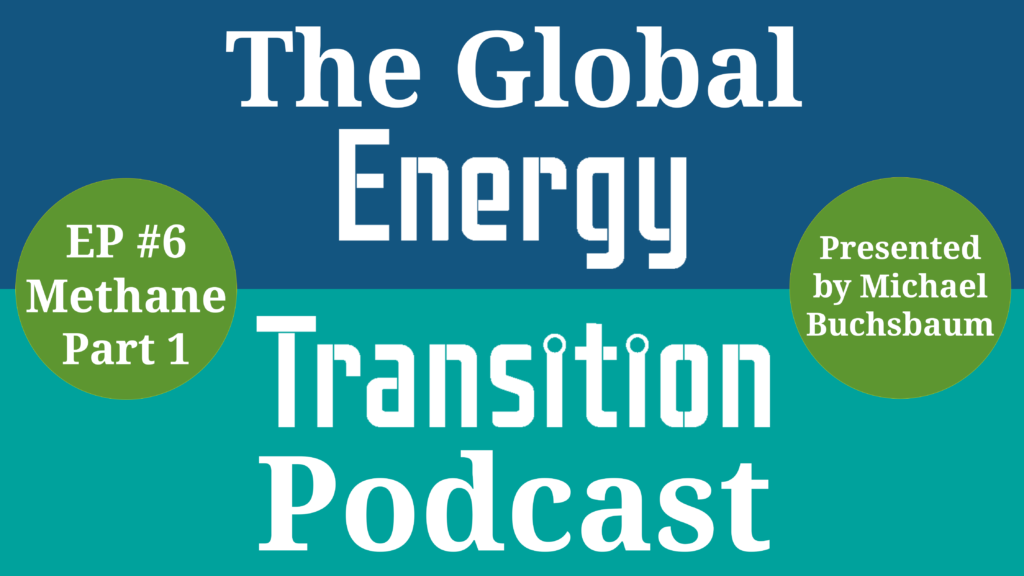South Korea is jeopardizing its ability to meet its 2030 methane reduction target under the Global Methane Pledge due to the country’s plans to massively expand fossil-based hydrogen, according to a recent study by Seoul-based Solutions for Our Climate (SFOC) led by legal, economic, financial, and environmental experts with experience in energy and climate policy. Jinny Kim explains.
All posts tagged: The Global Methane Pledge
Methane part 2 | The Global Energy Transition Podcast – Episode 7
While much of the international community’s climate action has focused on controlling carbon dioxide (CO2) emissions, in doing so, we’ve essentially given a pass on another very powerful greenhouse gas: methane.
With 86 times the warming impact of CO2 over a twenty-year period, new studies show that methane accounts for about 30-50 percent of today’s global warming.
Thankfully, after years of pressure from activists and climate scientists, in 2021 world leaders finally started paying attention to our growing methane problem. While US President Biden created something of a stir leading an international pledge to reduce methane emissions, the EU actually introduced some rules intended to control methane pollution both inside the 27-member bloc as well as outside of it.
In this second episode in a series focusing on methane, host Michael Buchsbaum interviews James Turitto, Campaign Manager for Methane Pollution Prevention at the Clear Air Task Force.
We also hear an excerpt from Sharon Wilson, Senior Field Advocate at Earthworks, who has long been documenting carbon leakage in the US.
You can play the episode below, and it’s also available on Spotify and Apple Podcasts.
Audio from the podcast was mixed and edited by audio expert Christian Kreymborg.
Methane part 1 | The Global Energy Transition Podcast – Episode 6

While much of the international community’s climate action has focused on controlling carbon dioxide (CO2) emissions, in doing so, we’ve essentially given a pass on another very powerful greenhouse gas: methane.
With 86 times the warming impact of CO2 over a twenty-year period, new studies show that methane accounts for about 30-50 percent of today’s global warming.
Thankfully, after years of pressure from activists and climate scientists, in 2021 world leaders finally started paying attention to our growing methane problem. While US President Biden created something of a stir leading an international pledge to reduce methane emissions, the EU actually introduced some rules intended to control methane pollution both inside the 27-member bloc as well as outside of it.
In this first episode in a series focusing on methane, host Michael Buchsbaum interviews Tim Grabiel, Senior Lawyer with the Environmental Investigation Agency in Brussels about the EU’s newly proposed methane regulations.
Then heinterviews Otilia Nutu, an energy researcher at Romanian climate think tank, 2Celsius to talk about how the new rules may or may not apply to the EU’s second largest producer of fossil gas.
Finally, we hear an excerpt of an interview with methane hunter, James Turitto with the Clean Air Task Force about what he discovered in Romania as well.
You can play the episode below, and it’s also available on Spotify and Apple Podcasts.
Shownotes:
- Click on this link to navigate to Environmental Investigation Agency and the EU’s new methane rules
- Click here for more info on methane in Romania and 2Celsius’ Otilla Nutu.
- Click here to read more about methane hunter, James Turitto and what he discovered in Romania.
Audio from the podcast was mixed and edited by audio expert Christian Kreymborg
Methane pledges with no cutting edges? Is the EU Commission ready to walk the talk on tackling crucial overall emissions?
At the beginning of the COP26 the United States, the European Union and over 100 partner countries launched the so-called Global Methane Pledge – aiming at reducing global methane emissions by at least 30 percent from 2020 levels by 2030. The overarching goal is to limit global warming to 1.5 degrees Celsius above pre-industrial levels (1850-1900). At the same time, the EU Commission is working on a legislative act to reduce methane emissions in the oil, gas and coal sectors. Andy Gheorghiu summarizes the state of play, explains the importance of the petrochemical sector and the supply chain and questions how ambitious the upcoming EU methane regulation might be.
COP26 – diplomatic springboard to a world post fossil fuels?
Despite several significant shortcomings, the UN Climate Change Conference in Glasgow (COP26) united the globe behind the commitment to limit the warming of global climate to 1.5C degrees. Consigning coal to history was one of the central mission statements ahead of and during the conference. Just as important, though less prominent, are the implications of COP26 for the role of other fossil fuels in the global transition to net-zero – most notably for gas. Maria Pastukhova and Lisa Fischer from E3G take a closer look at how this year’s COP will shape the future gas transition diplomacy and whether the new initiatives launched can act as a springboard for the global transition beyond fossil gas.